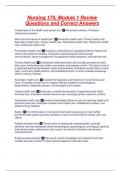Nursing 170, Module 1 Review
Questions and Correct Answers
Components of the health care system are: ✅Consumers (clients), Providers,
Unlicensed providers
What are the 6 levels of healthcare? ✅Preventive health care, Primary health care,
Secondary health care, Tertiary health care, Restorative health care, Restorative health
care, Continuing health care
Preventative health care ✅Focuses on educating and equipping client to reduce and
control risk factors for disease. Examples include programs that promote
immunizations, stress management, occupational health programs, and seat belt use.
Primary health care ✅Emphasizes health promotion and includes prenatal and well-
baby care, family planning nutrition counseling, and disease control. This level of care is
a sustained partnership between clients and providers. Examples include office or clinic
visits, community health centers, and scheduled school- or work-centered screenings
(vision, hearing, obesity).
Secondary health care ✅Includes the diagnosis and treatment of acute illness and
injury. Examples include care in hospital settings (inpatient and emergency
departments), diagnostic centers, and emergent care centers.
Tertiary health care ✅Acute care, involves the provision of specialized and highly
technical care. Examples include intensive care, oncology centers, and burn centers.
Restorative health care ✅Involves intermediate follow-up care for restoring health and
promoting self-care. Examples include home health care, rehabilitation centers, and
skilled nursing facilities.
Safety: ✅The minimization of risk factors that could cause injury or harm while
promoting high-quality care and maintains a secure environment for clients, self, and
others.
Patient-centered care: ✅The provision of caring and compassionate, culturally
sensitive care that addresses clients' physiological, psychological, sociological, spiritual,
and cultural needs, preferences, and values. the client is included in the decision
making process.
Evidence base practice: ✅The use of current knowledge from research and other
credible sources on which to base clinical judgement and client care.
,Informatics: ✅The use of information technology as a communication and information-
gathering tool that support clinical decision-making and scientifically based nursing
practice.
Quality Improvement: ✅Care-related and organizational processes that involves the
development and implementation of a plan to improve health care services and better
meet clients' needs.
Teamwork and Collaboration: ✅The delivery of client care in partnership with
multidisciplinary members of the health care team to achieve continuity of care and
positive client outcomes.
Advocacy: ✅Support of clients' health, wellness, safety, and personal rights, including
privacy.
Responsibility: ✅Willingness to respect obligations and follow through on promises.
Accountability: ✅Ability to answer for one's own actions
Confidentiality: ✅Protection of privacy without diminishing access to high-quality care.
Autonomy: ✅The right to makes one's own person decisions, even when those
decisions might not be in that person's own best interest.
Beneficence: ✅Action that promotes good for others, without any self-interest
Fidelity: ✅Fulfillment of promises, being faithful.
Justice: ✅Fairness in care delivery and use of resources.
Nonmaleficence: ✅A commitment to do no harm.
Veracity: ✅A commitment to tell the truth.
What is an example of ethical guidelines? ✅American Nurses Association's Code of
Ethics
HIPAA ✅Health Insurance Portability and Accountability Act
ADA ✅Americans with Disabilities Act
MHPA ✅Mental Health Parity Act
PSDA ✅Patient Self-Determination Act
,What is the nurses role for informed consent? ✅Witness informed consent.
-Ensure that the provider gave the client the necessary information.
-Ensure that the client understood the information and is competent to give informed
consent.
-Have the client sign the informed consent document.
-Notify the provider if the client has more questions or appears not to understand any of
the information. The provider is then responsible for giving clarification.
- Document questions the client has, notification of the provider, reinforcement of
teaching, and use of an interpreter.
What are 3 types of Advanced Directives? ✅Living will, Durable power of attorney for
health care, Provider's orders
What are the types of documentation formats? ✅Flow charts: show trends in vital
signs, blood glucose levels, pain level, and other frequent assessments.
Narrative documentation: records information as a sequence of events in a story-like
manner.
Charting by exception: uses standardized forms that identify norms and allows selective
documentation of deviations from those norms.
Problem-oriented medical records: are organized by problem or diagnosis and consist
of a database, problem list, care plan, and progress notes. Examples include SOAP,
PIE, and DAR.
What are the types of reporting? ✅Change-of-shift reports, Telephone reports,
Telephone or verbal prescriptions, Transfer (hand-off) reports, Incident reports (unusual
occurrences)
SOAP ✅Subjective data
Objective data
Assessment
Plan
PIE ✅Problem
Intervention
Evaluation
DAR ✅Data
Action
Report
Who are RNs able to delegate to? ✅Other RNs
, PNs (practical nurse)
AP (assistive personnel)
What are the 5 rights to delegation? ✅Right task
Right circumstance
Right person
Right direction and communication
Right supervision and evaluation
What are the primary sources for data collection? ✅Subjective: What the client tells the
nurse
Objective: Data the nurse obtains through observation and examination
What are the secondary sources for data collection? ✅Subjective: What others tell the
nurse based on what the client has told them
Objective: Data the nurse collects from other sources (family, friends, caregivers, health
care professionals, literature review, medical records)
What are the steps of Maslow's Hierarchy of Basic Needs? ✅Self-actualization
Self-Esteem
Love and blogging
Safety and security
Physiological
What are the components of critical thinking? ✅Knowledge
Experience
Competence
Attitudes
Standards
Critical thinking skills: ✅- Observe.
- Use correct techniques for collecting data.
- Differentiate between relevant and irrelevant data, and between important and
unimportant data.
- Organize, categorize, and validate data
- Interpret assessment data and draw a conclusion
Affective Commitment ✅Involvement in the profession, keeps current and is involved,
producing a satisfying experience.
Normative Commitment ✅Obligated - the feeling of being obligated ex. personal or
family experiences




